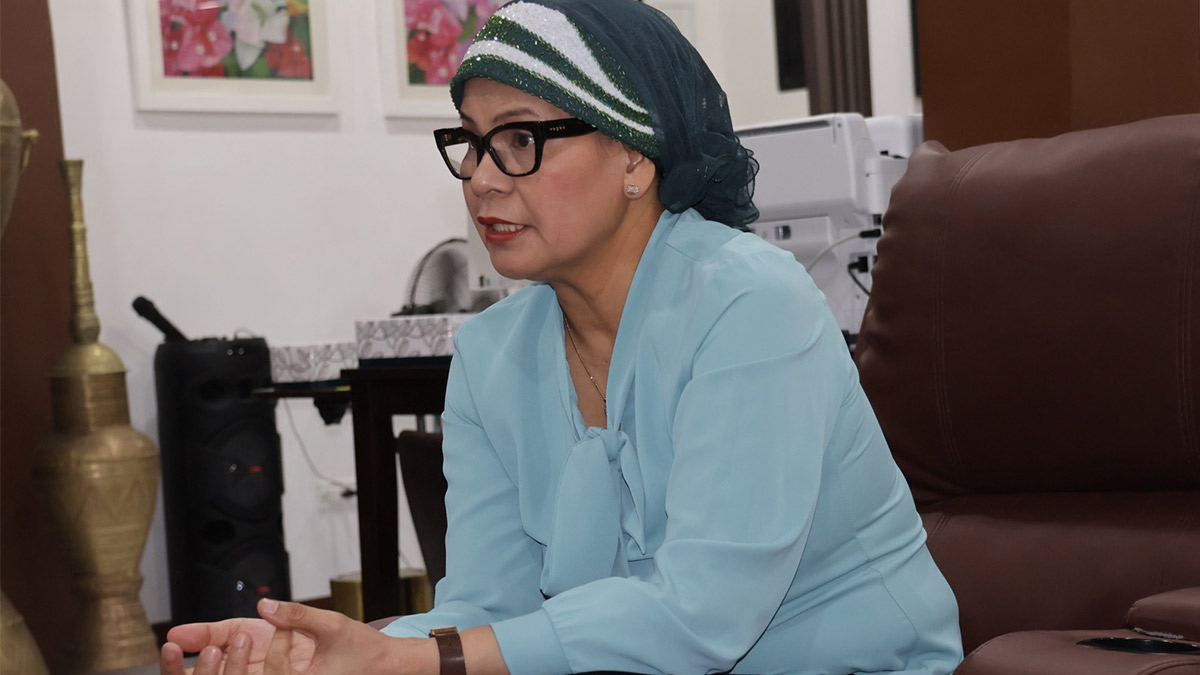The peacemakers: Iron ladies use velvet glove

WORKING FOR PEACE Baintan Adil-Ampatuan, a member of the Bangsamoro parliament, says the Moro Islamic Liberation Front is now “peace oriented.” —Zuhaira Mangansakan/BDA
(Last of a series)
MARAWI CITY, BARMM, Philippines —The handsome woman wearing a headscarf stood within breathing distance of gunmen armed with automatic rifles.
They were demanding that she give up a rice shipment for people forced from their homes in President Joseph Estrada’s “all-out war” against the Moro Islamic Liberation Front (MILF) in 2000.
When Farida Mangcaan refused, one gunman fired a round in the air.
“If I am going to die, then I will die,” she said to herself.
She told the gunmen the rice from her humanitarian agency, Community and Family Services International (CFSI), was for the starving, and she could not give it away.
READ: DSWD establishes program to strengthen peace process in Bangsamoro
They left with her shipment, then came back and decided all they needed were 10 sacks and went away.
The incident, which is decidedly scary, is regarded simply as a day in the office.
Noraida Abdullah Karim, CFSI director for the Mindanao program, says these challenges are there each time she and her staff take to the road to deliver relief, to coax victims of war and circumstance to overcome suffering and stand on their own.
She has seen it all since the start of her agency’s involvement in delivering relief for about a million people uprooted in a decade of natural and man-made calamities in central Mindanao.
Delivering rice was, at one time, the most problematic. Often, politicians want to do the distribution themselves.
Noraida had seen the wrong end of a gun pointed at her while supervising relief aid for intended beneficiaries. Her staff had been threatened with being burned at the stake unless evacuees went back to their still insecure huts on orders of the mayor.
Recovery, reconstruction
The smoke had not yet cleared in Estrada’s war when CFSI partnered with the World Bank to access funding for the recovery and development of the devastated communities, even as the government and the MILF were just embarking on negotiations for peace.
Restarting livelihood activities was a major priority, along with rebuilding community infrastructure, psychosocial services for women and children, and care for orphans, persons with disabilities, the elderly, and Indigenous peoples.
All of these activities are still on the agenda of Noraida, 54, and Farida, 43, the head of CFSI’s suboffice in the Lanao region. Some of CFSI’s reconstruction activities in the MILF-influenced areas are carried out with its local partner, the Bangsamoro Development Agency (BDA).
“When we see someone oppressed, it’s our duty to help them,” said Farida.
In addition to working in the MILF camps, she supervised the response and recovery initiatives for the displaced people in her native Marawi after Maute and Islamic State militants seized the city in 2017.
Farida organized livelihood programs and, later on, moved to mitigate the spread of COVID-19 in the settlements at the height of the pandemic.
Many of the displaced have yet to return home, even to the repaired areas of Marawi, because of property disputes.
But residents have begun to enjoy the rebuilt modern city center leading to Jose Rizal Park at the edge of the magnificent Lake Lanao.
Changing the mindset
During the holy month of Ramadan, food stalls sprang there for those breaking fast.
In Cotabato City, Baintan Adil-Ampatuan helps government and development agencies, including CFSI and BDA, carry out assistance programs in the six MILF camps.
An engineer, she is a coordinator for the government of the body that oversees the transformation of camp communities and also a member of the project board for CFSI’s Bangsamoro Camps Transformation Project.
Colleagues call her the “iron lady,” because of her meticulous attention to detail and insistence on accountability.
Baintan talks about priorities in the transformation project to access the benefits of infrastructure and socio-economic development.
This meant turning the core and outer communities of the “six previously acknowledged camps” of the MILF into staging areas of production and partnerships and changing the mindset from “being war focused to being peace oriented.”
“Camp communities are better equipped to use the tools of dialogue and mediation to resolve conflict,” Baintan said.
In March, Baintan joined ceremonies at Camp Abubakar, marking the 10th anniversary of the signing of the comprehensive peace agreement between the government and the MILF.
President Marcos attended the event and declared his commitment to proceed with elections scheduled next year to bring political normalcy to the Bangsamoro Autonomous Region in Muslim Mindanao.
Promise of peace
The significance of the event was not lost on Baintan.
She recalled that the President’s father, former President Ferdinand Marcos Sr., had declared martial law in 1972 and sent troops to disarm combatants, sparking a full-blown Moro rebellion and spreading misery and despair.
“Here’s the son promising peace,” she said.
Baintan, Noraida and Farida—women with nerves of steel—are at the forefront of that drive toward reconstruction and reconciliation.
Noraida had experienced displacement during the wars, storms and flooding that swept Cotabato in her youth and regularly sent her fleeing to evacuation centers.
“I know how it is to feel helpless,” she said.
“During those times, I also joined the line for alms, for used clothing, for nutribuns. When I reached the givers, they had nothing more to give. I told them I had been standing here, under the sun, waiting,” Noraida said.
It’s a feeling she doesn’t want people now under her wing to go through. (The writer is a former reporter and aid worker who has been assigned to conflict zones in Asia, Africa, the Balkans and the Middle East.)